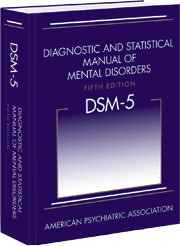Lesson 9: DSM in Case Management
Attention

Click HERE to visit the webstie on DSM V
Learning Outcomes
Upon completion of this lesson's material, students will be able to:
- Learn the basics of DSM-V to facilitate reading client files and discussing cases with clinicians.
- Understand interactions of co-occurring medical issues
Teaching
The Diagnostic and Statistical Manual (DSM) is a reference book that describes the criteria necessary in order to qualify for each mental illness. In Maine, case managers do not provide a mental health diagnosis. In order for a client to qualify for case management, the client will already have been given a diagnosis by a master's level clinician or a doctor. The diagnosis can be very useful to a case manager's work.
Co-occurring medical issues speak to the interaction between conditions that the client may experience. When we look at co-occurring disorders, it generally speaks to substance abuse paired with a mental health issue. Here we look at broader medical issues combining with mental health problems. For example, a client who has diabetes that is not well managed may present with depression. It is key to be aware of the possible interactions between medical conditions and mental illness.
The manual has undergone a very recent update from DSM-IV-TR to DSM-V. There have been some very important changes to DSM V and we are still waiting to see how they will impact service providers such as Case Managers.
In accordance to our PSR Values we are LESS concerned about the actual diagnosis and more concerned about the potential IMPACT the symptoms will have on a person's life. For example:
Jerry has been diagnosed with Schizophrenia. While much of his symptoms are under control, he still maintains some bizarre delusions. Many of these include claims he makes for having climbed Mt. Everest and that he was once in the Secret Service. It has been confirmed that neither of these is actually true, but Jerry maintains that they are.
Now, in this example, consider how Jerry's delusions may impact him in areas of his life...i.e. what barriers he may experience. Keep in mind that the ENVIRONMENT in which Jerry wants to act is as important as anything else. Each environment has it's own expectations for behavior. Let's look at Jerry's environments and see where his symptomology might give him some trouble:
Symptoms |
Environment |
Potential Barriers |
| Delusions related to things he has done including climbing Mt. Everest and being a former member of the Secret Service | Work at Friendly's Restaurant |
|
| Social Club |
|
|
| Shopping at Hannaford |
|
As CMs we usually spend most of our time developing plans to address these BARRIERS that result as a function of the symptoms. This is how we teach and help individuals with MI live successfully in the world.
Assessment
Lesson 9 Assignment
Use THIS online source for DSM Diagnoses (though I believe that this resource is still based on DSM IV).
- Select ONE diagnosis and provide the name and a summary of the symptoms
- Describe a "case"...you can make one up...of a person who has this diagnosis and the specifics about their case.
- Create a table (similar to the one in the Lesson) and outline the barriers for this person's functioning in at least three different environments (yes, you can use the three that I picked or come up with your own).
| DSM Assignment | |
Cover Name, course name, date, title of assignment, etc. |
10 pts. |
Case Study Case study is described with sufficient detail |
45 pts. |
Table Table addresses barriers in at least three different environments. |
45 pts. |
Lesson 9 Discussion
Many changes have come about because of the new DSM (DSM V). Do some research on these changes changes and discuss how this might change service provision...if it does.